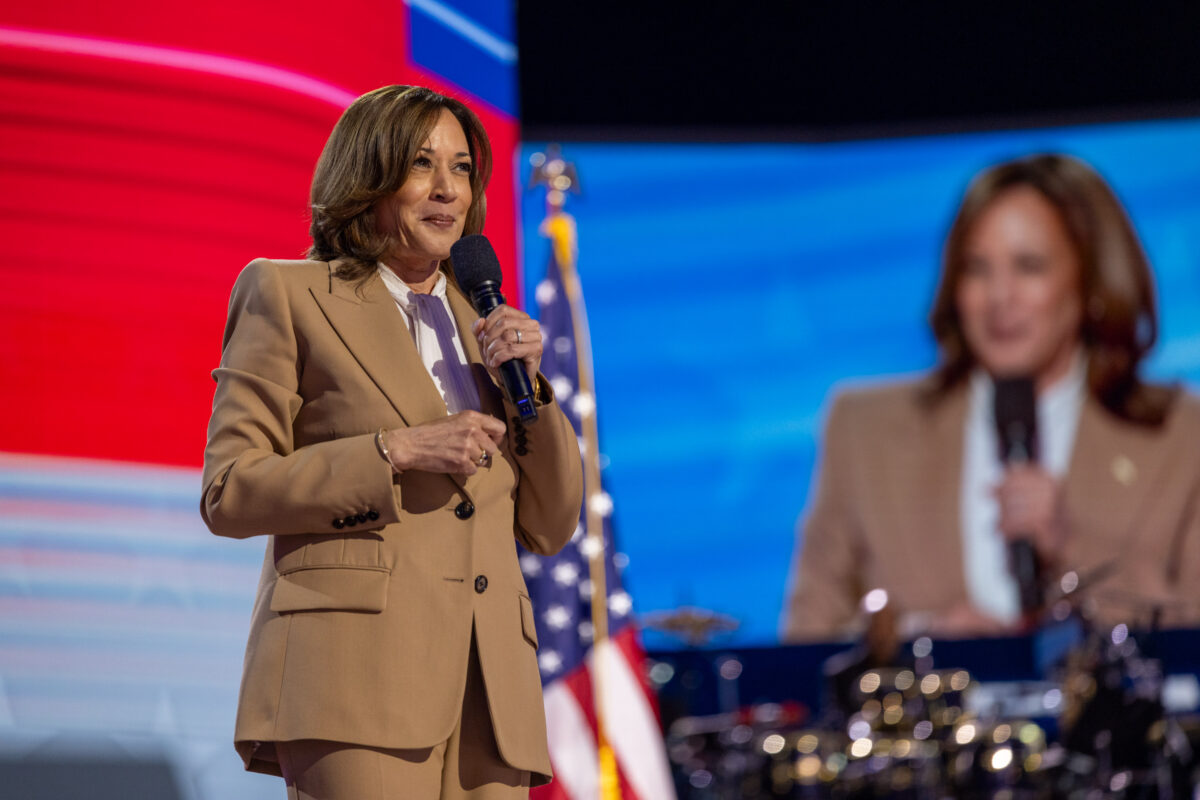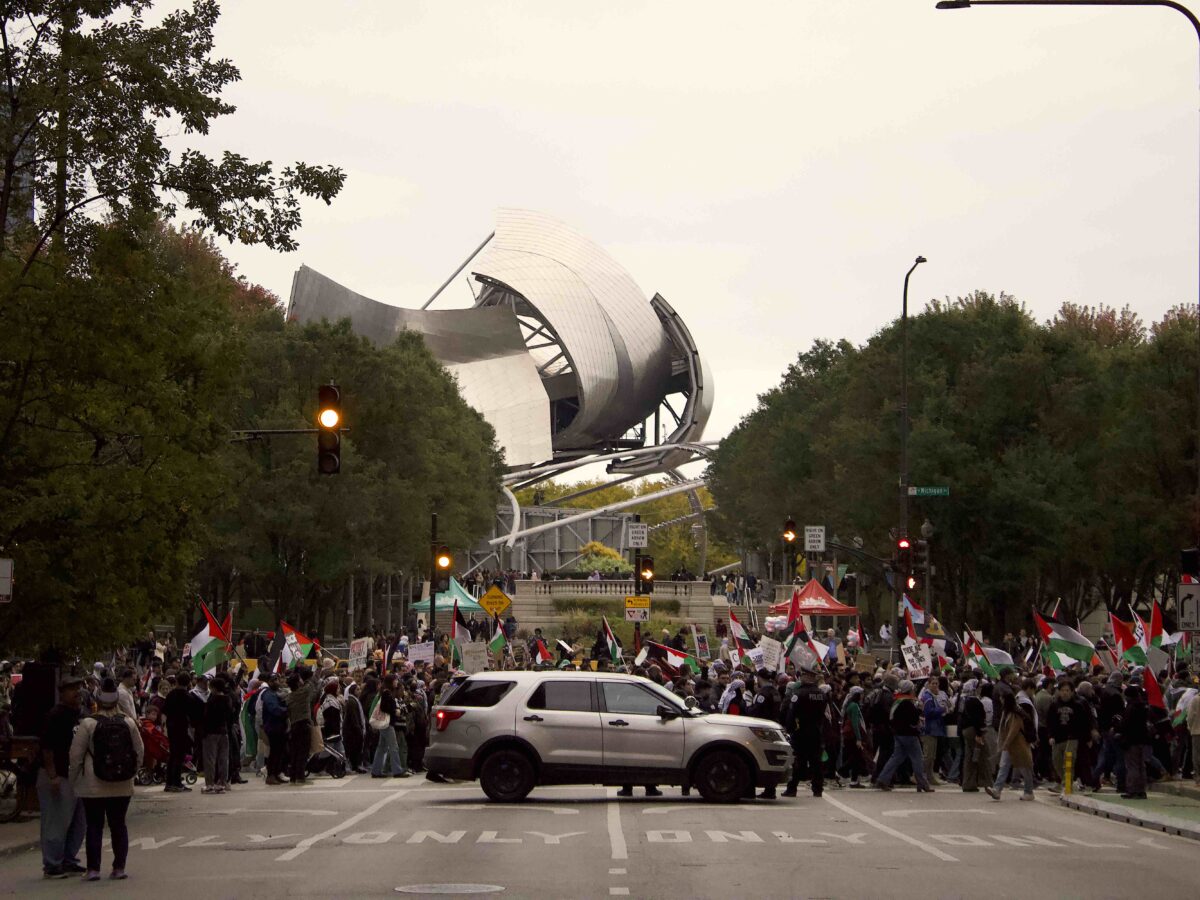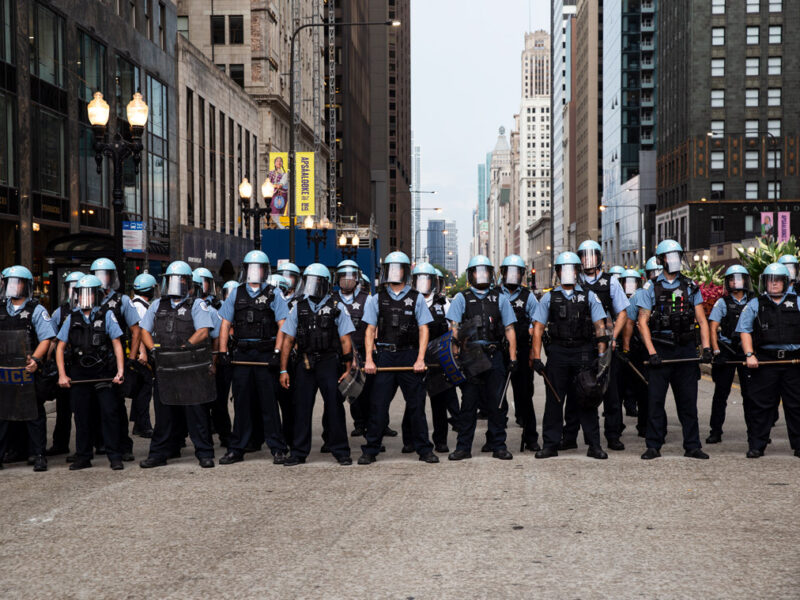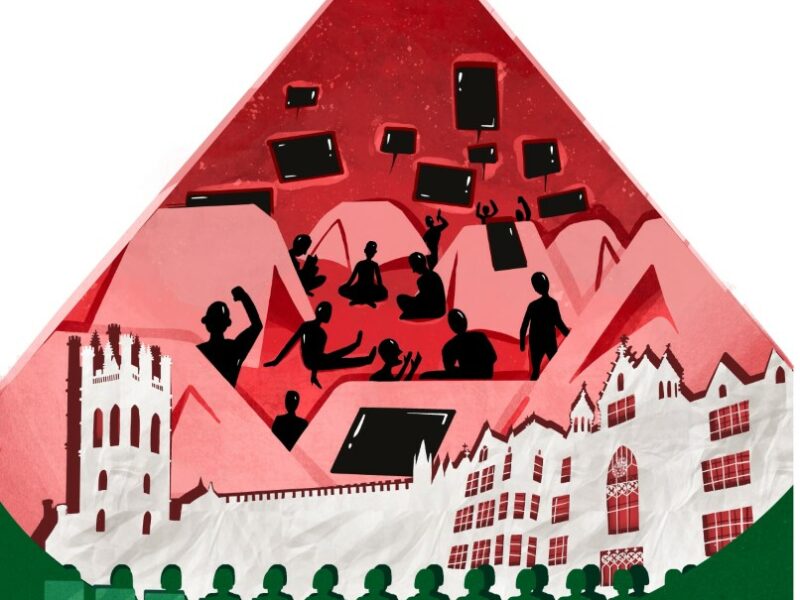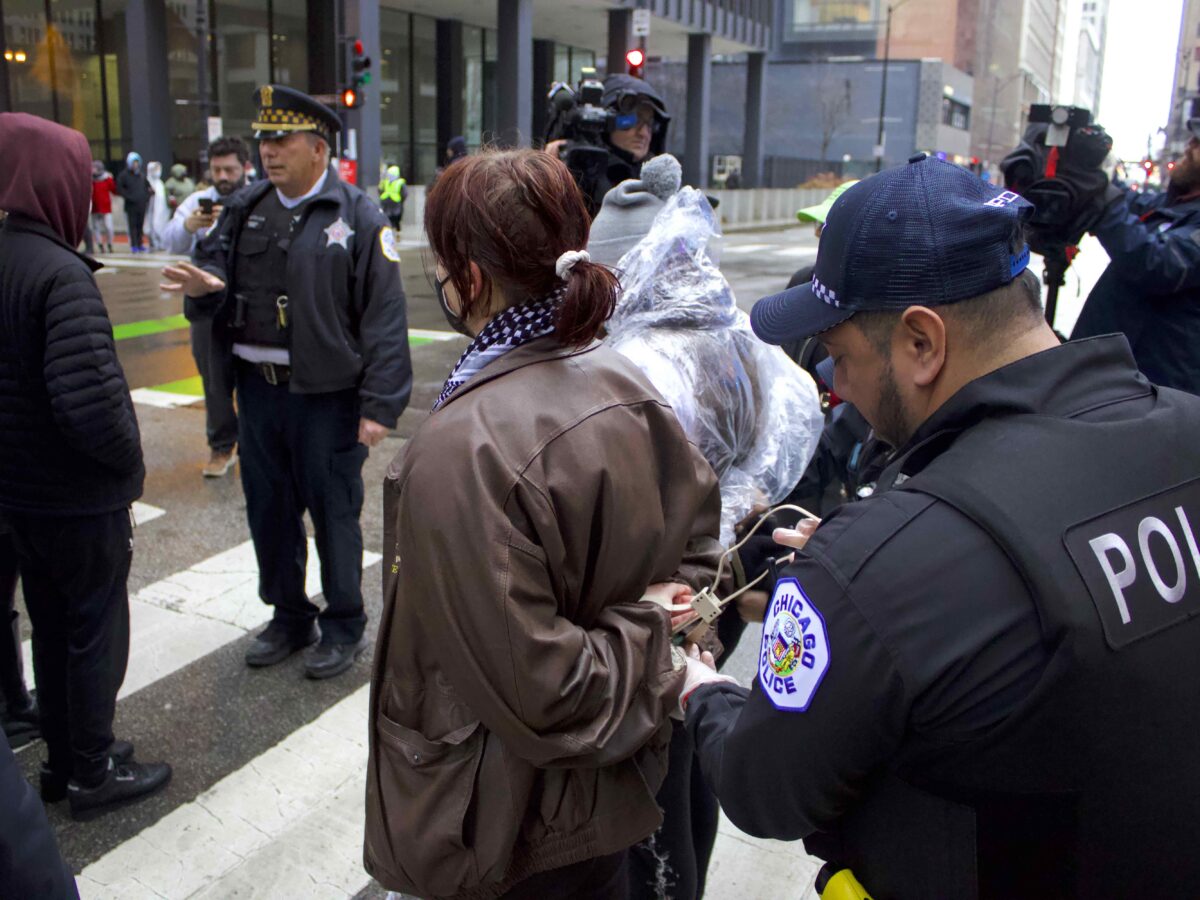The elevation of Vice President Kamala Harris to the top of the Democratic Party’s presidential ticket has energized key coalitions within the party’s base, including Black, Latinx, and female voters.
However, Harris’s candidacy has not been universally embraced by Arab Americans and progressive voters on the South Side, many of whom are incensed by the administration’s support for Israel’s ground invasion and bombing campaign in Gaza. As with President Joseph Biden during the 2024 primary, some voters are saying they won’t cast a vote for Harris.
Fahad Sajid is a thirty-four-year-old Pakistani American who lives in Hyde Park. After Harris became the presumptive Democratic nominee, he told the Weekly nothing has changed in terms of how he’ll vote. Sajid, who identifies as a social democrat, expressed concerns about Harris’s track record on foreign policy, specifically regarding Israel and Palestine.
“Kamala Harris was part of the administration that enabled the ethnic cleansing of Palestinians in Gaza, and there is no indication that a Harris administration would be any different,” he said.
While Harris has expressed some empathy for the plight of the Palestinians, saying at a recent campaign event that “far too many” Palestinians have been killed, she also defended Israel’s right to “go after Hamas.” To date, more than 40,000 Palestinians have died in the conflict, according to the Gaza Ministry of Health.
Sajid, who also took part in the campus protests at the University of Chicago this spring, puts little stock in the argument that Harris might be more susceptible to pressure from the left than a Trump administration.
“Voting for the Democratic Party means giving them carte blanche. It does not hold [them] accountable,” he said. “Voters of conscience need to—even if it means losing an election or two—need to make themselves heard, need to make their power felt, and need to bring the Democratic Party back to the left and in line with real progressive values.”
Sajid plans to vote for Jill Stein, the Green Party candidate who has pledged to demand a ceasefire in Gaza and end all military aid to Israel. According to Al Jazeera, she is considering adding an Arab American as her running mate.
Sajid said voting for Stein is not only the morally right choice but also a strategic move aimed at breaking the two-party system and pushing for more radical change.
“This country keeps moving more and more rightward, and we’re going down the path of fascism,” he said. “The only way to stop [that] is to have alternatives, is to have choice, is to actually make the electoral system and the parties more competitive.”
A poll conducted by Marquette University Law School earlier this month shows that Stein is the choice of about only 2 percent of voters nationally, so her candidacy is a long-shot bid. As in 2016, however, she could play spoiler to Democrats in certain crucial swing states.
Several progressive activists who attended a recent court hearing about the route of a planned protest march during the Democratic National Convention (DNC) said they wouldn’t vote for the Democratic ticket absent an immediate ceasefire in Gaza and an end to the occupation of the West Bank.
“If the policies don’t change, my vote won’t change,” said Andres Guzman, who lives in Pilsen and wrote in “Gaza” on his March Democratic primary ballot to protest the Biden Administration’s aid shipments to Israel. “As long as the policy says ‘murder more Palestinians,’ I’ll still vote [for] Gaza, not Democrat.”
Dod McColgan, an organizer with the Chicago Alliance Against Racism and Political Repression (CAARPR), said that as long as “our tax dollars are going to fund the war,” activists need to use “every means available” to press for a ceasefire. “We’ll protest at the DNC, and we’ll protest at the ballot box,” McColgan said.
While Illinois is a blue stronghold, “uncommitted” voters could influence outcomes in nearby battleground states, such as Minnesota and Michigan. In those states, more than 150,000 Democrats voted “Uncommitted” in the spring presidential primaries to protest the Biden administration’s military aid to Israel.
In the 2016 presidential election, former Sen. Hillary Clinton (D-NY) won Minnesota by fewer than 50,000 votes, and Trump won Michigan by a slim margin of nearly 11,000 votes. In 2020, Biden decisively won both states.
As in those Midwestern states, a little more than 20 percent of Democratic voters in Cook County also didn’t vote for Biden in the March primary, according to WBEZ, despite him being the incumbent president and the lack of serious challengers to his bid.
That figure was substantially higher in areas with large Arab American communities, cracking the 50 percent mark in two precincts in Palos Township. Known as “Little Palestine,” this strip in the city’s southwest suburbs is part of a wider Palestinian community in the Chicago metropolitan area, one considered to be the largest in the country.
Whether these traditionally Democratic voters will come back into the party’s fold on November 5 remains an open question, despite party leaders’ clarion call that former President Donald Trump represents an existential threat to American democracy.

For one answer, look no further than suburban Bridgeview. On 87th Street just west of Harlem Avenue, is a roadside electronic billboard projecting the image of a bloody, forlorn young girl, an explosion erupting in the background.
The text on the billboard reads: “Gaza’s children deserve to hear birds, not bombs,” before scrolling to banners that say, “Let Gaza live, ceasefire now,” and “Fund American health, not Israeli war crimes.”
These messages reflected the fury of the billboard’s owner, Khalil “Abu Faris” Ismail, over the ongoing Israeli invasion of the Gaza Strip following the deadly October 7 attack inside Israel by Hamas militants.
In addition to the billboard, Ismail owns Al Bawadi Grill, a popular Middle Eastern restaurant, and is a prominent fundraiser in Bridgeview’s Palestinian American community for relief efforts in Gaza.
“It’s not a war, it’s genocide,” he told the Weekly over a paper cup of coffee.
Like many Palestinians in the United States, Ismail’s life has been shaped by the decades-long conflict in Israel and Palestine. In 1969, he was born in Amman, the capital of Jordan, but his family hails from Ein Karem, a hillside village on the outskirts of Jerusalem.
Jews, Christians, and Muslims used to live there together in peace, Ismail said—that is, until Israel’s 1948 War of Independence, or, as the Palestinians call it, the Nakba, meaning “catastrophe” in Arabic. His family fled their ancestral home that year alongside millions of other Palestinians for the relative safety of neighboring Arab states.
The irony and the tragedy, Ismail said, is that just after World War II, when Eastern European Jews started arriving in Israel, they were welcomed with open arms in Ein Karem.
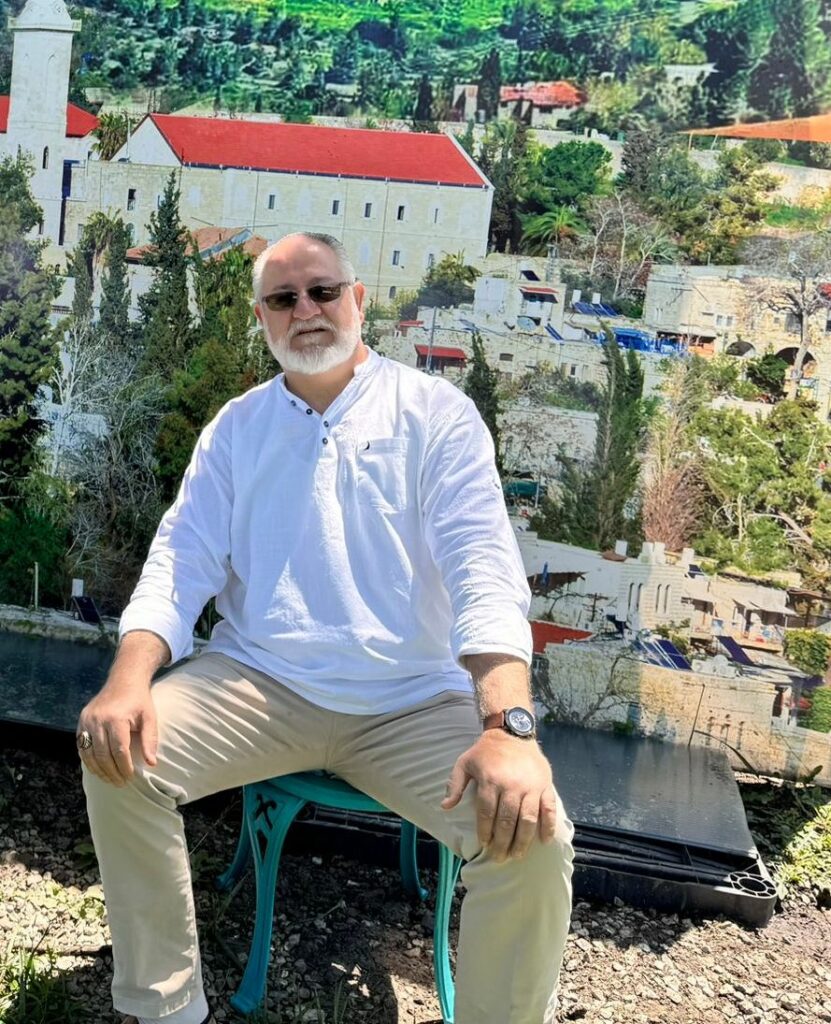
“You invite them into your home, you clothe and feed them, not expecting them to kick you out, but that’s what they did,” he said.
On a recent visit to Israel and Palestine, Ismail made a point to return to Ein Karem to visit his father’s home. He said its current occupant, an Israeli named Mikhail, said he was sorry, but that it “is what it is.”
“He knows it’s my house,” Ismail said sternly.
He expressed uncertainty about whether he would vote for president in the upcoming election.
His frustration with American political leaders of all stripes stems from a long history of U.S. military interventions in the Middle East, which many in his community view as disproportionately harming Muslim populations.
“Every American leader gave the green light to kill Muslims—Obama, Clinton, Bush, Bush senior, in Afghanistan, Iraq, Serbia,” he said. “Every leader who comes to power does a massacre.”
American presidents have gone to war on behalf of Muslim-majority nations as well. In 1991, George H.W. Bush launched Operation Desert Storm against Iraqi forces to protect the sovereignty of a majority-Muslim country, Kuwait, which Iraq had invaded. And in 1995, under Bill Clinton, a U.S.-backed NATO bombing campaign halted the Serbian forces from killing more Bosnian Muslims, after a UN peacekeeping force failed to protect them at Srebrenica.
How to Protest Safely
Harris and other Democratic leaders, including Senate Majority Leader Chuck Schumer (NY) and his second-in-command, Dick Durbin (IL), have urged Israel to make a hostage deal and agree to an immediate, temporary ceasefire. Asked about those statements, Ismail was curt.
“Politicians all lie,” he said.
Ismail doesn’t expect Trump to take a different foreign policy tack with regards to the plight of the Palestinians. It was Trump’s administration in 2020 that spearheaded the Abraham Accords normalizing diplomatic relations between Israel and four Arab states that agreed to recognize its sovereignty, much to the chagrin of Palestinian political leaders. But he said the former president would be much better for his bottom line.
“For our country, he was the best leader for [the] economy,” he said. “We need our taxes to stay here, not to do a bomb on our own people.”
Although Ismail is unlikely to vote this cycle, he is not giving up on his efforts to help the people of Gaza. At a recent event he hosted, Ismail said he raised $250,000 to provide scholarships for Palestinian students.
Mo and Sam, two teenagers working at a DHL/FedEx shipping location at a strip mall in Bridgeview whose walls were adorned with Quranic verses and the Palestinian flag, said people in their community were going to register their displeasure with the current Administration’s policy by simply refusing to vote.
“Nobody likes Biden or Harris,” Sam said glibly.
Zeid Yesseen, a twenty-two-year-old Palestinian American who works at Holy Buckets in Bridgeview and has much of his family living in the occupied West Bank, also said he planned to entirely abstain from voting this fall.
“I’m not going to vote. I don’t like politics. Whatever we do, whoever we vote for, it won’t make any difference,” he said.
Kamal Ateyah, a Yemeni American supermarket owner in Bridgeview, has a different perspective. He is voting Republican, in part because he looks back upon the Trump presidency as halcyon days for his pocketbook. But he also thinks the billionaire real-estate scion won’t equivocate with Israel’s leaders, something he believes Democrats have done.
“I’m voting for Trump. Foreign policy or domestic, I like how he takes care of this country. He tells you how it is, he doesn’t beat around the bush. I like that in him,” Ateyah said.
Displayed on the cashier’s counter of his shop is a box of stickers with slogans such as “Free Palestine,” as well as a donation box to aid children starving in Yemen.
Regarding the conflict in Gaza, Ateyah predicted, “Trump will say, ‘Cut it out, that’s enough, cut it out,’ and Israel will have to stop.”
“When Trump says something, he means it,” Ateyah continued. “He’ll put Netanyahu in his place.”
Eman Abdelhadi, a professor of comparative human development at the University of Chicago and organizer in the campus ceasefire movement, wrote in “Free Gaza” during the primary to protest Biden’s support of Israel. She said Vice President Harris could earn her vote by pledging to impose “material consequences,” such as an arms embargo, on Israel for committing war crimes, as well as a limit to military and political support for Israeli prime minister Benjamin Netanyahu’s government.
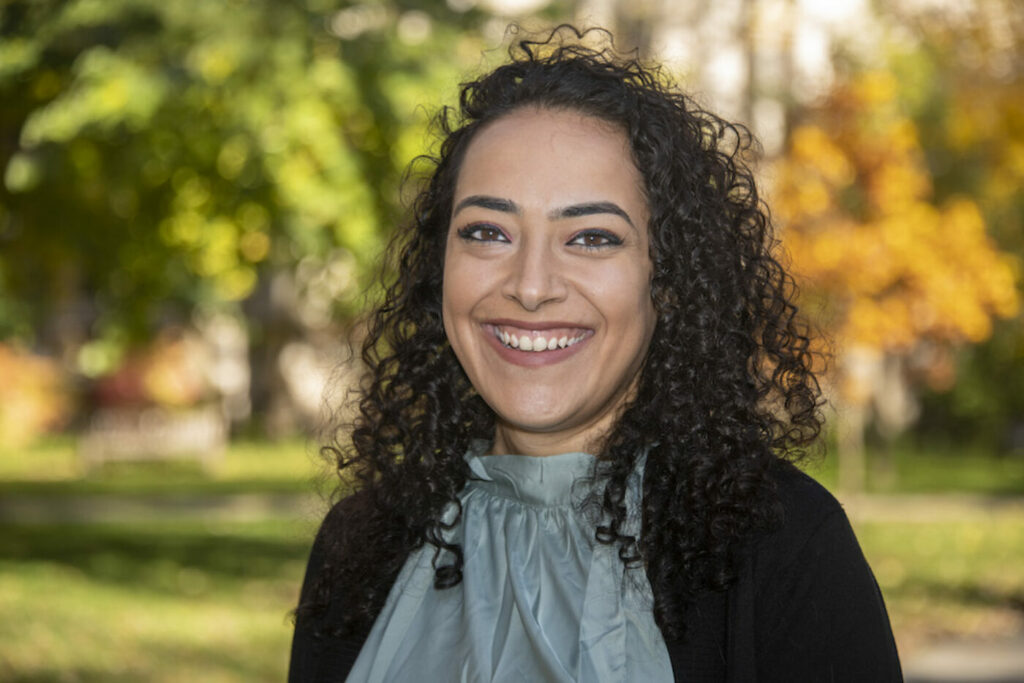
“It’s important to think about the fact that our options in the fall are not [just] Kamala or liberation,” Abdelhadi said. “For me, a vote is not a moral endorsement. If it were, I would never vote for Kamala Harris, but a vote is a strategic act. It would be strategic to vote for her campaign if she offered meaningful changes.”
For “Mara,” a thirty-four-year-old progressive Hyde Parker, the damage that would be done by a second Trump presidency is grave enough that she plans to vote for Harris and her recently named vice presidential pick, Minnesota Governor Tim Walz. (Mara requested anonymity, so the Weekly is using a pseudonym.)To dispel the potential Republican claims of election fraud should Harris win, Mara said she wants the national popular vote to be as clearly stacked against Trump as possible, even if it doesn’t influence the Electoral College outcome.
“Even though my vote is in Illinois…I do want to be as definitively clear as possible that the country rejects Trump, just like Republicans for [nearly] my whole life,” she said.
Like other progressives the Weekly interviewed, Mara has supported Democrats in the past but did not vote for Biden in the March primary because his administration provided military aid for Israel. She explained that her vote in the primary was meant to signal to the Democratic Party that crucial base voters would be lost “if they did not stop the genocide.”
“This is a decades-long conflict, and the Palestinian people deserve to be free,” she added.
Mara said that while her protest vote didn’t stop the Biden administration from continuing to ship weapons to Israel, she felt it did offer cover to Democratic politicians to stake out pro-Palestinian positions.
Those Democrats who have spoken out on behalf of Palestine have encountered mixed results. Jamal Bowman (NY-16) and Cori Bush (MO-1), two House Democrats who were caustic in their denunciations of Israel’s ongoing military campaign in Gaza, were both ousted in this year’s primaries, after the American Israel Public Affairs Committee (AIPAC) spent more than $20 million to unseat the pair. Ilhan Omar (MN-5), another outspoken critic of Israel, won her primary race on Tuesday; AIPAC stayed out of that race.
But in the weeks since Harris became the presumptive Democratic nominee, Mara was persuaded by the campaign about the looming danger of Project 2025, the 900-page policy document released by the Heritage Foundation, a conservative think tank, that charts what a second Trump term could look like.
Trump has attempted to distance himself from some of Project 2025’s more extreme proposals, which include reversing the FDA’s approval of the abortion pill mifepristone, using active-duty military members and National Guard to police the southern border, and shrinking numerous federal agencies including the National Oceanic and Atmospheric Administration and the U.S. Agency for International Development. But the project was spearheaded by former Trump White House officials Paul Dans and Spencer Chretien, both of whom could return to influential positions if he regains the Oval Office.
About the prospect of another four years of Trump in office, Mara said, “It will set us back decades.”
Max Blaisdell is a fellow with the Invisible Institute, a staff writer for the Hyde Park Herald, and an investigative reporter for the Weekly.

